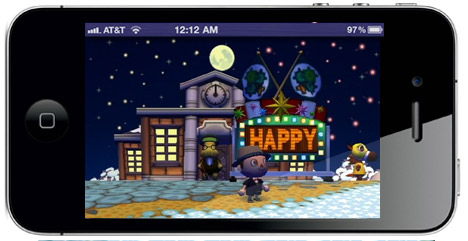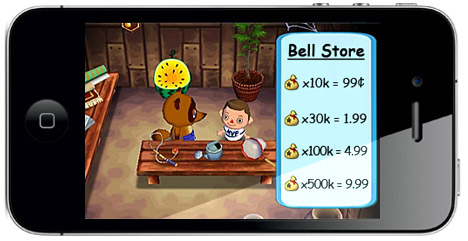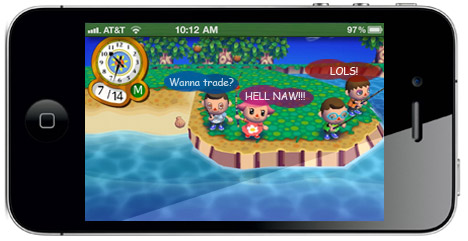Trending
Opinion: How will Project 2025 impact game developers?
The Heritage Foundation's manifesto for the possible next administration could do great harm to many, including large portions of the game development community.

Featured Blog | This community-written post highlights the best of what the game industry has to offer. Read more like it on the Game Developer Blogs or learn how to Submit Your Own Blog Post
A lot of talk has been thrown around recently by Nintendo’s investors due to poor 3DS sales that Nintendo should go 3rd party and pop their IPs on other devices. IGN even fired up the What If Machine and imagined what Animal Crossing would be like on...

This has been reposted from http://danfischbach.com/nintendo-software-on-3rd-party-devices/

IGN Mockup - Animal Crossing on the App Store
IGN Mockup - Animal Crossing on the App Store
A lot of talk has been thrown around recently by Nintendo's investors due to poor 3DS sales that Nintendo should go 3rd party and pop their IPs on other devices. IGN even fired up the What If Machine and imagined what Animal Crossing would be like on the App Store. At first glance it seems like a hunky-dory situation, but as you pull back the curtain this wouldn't be so fun. Let's look into it.
Admittedly it's been a long time since I played my share of Animal Crossing, which was way back when on the GameCube. I remember waking up one Sunday and playing it for nine hours straight. Good times. However, it was this amount of play (and other titles at the time) which swayed me to stay away from the DS and Wii iterations on this franchise. I'll be coming back to AC when the 3DS iteration comes out due to StreetPass.
So why should Nintendo not go 3rd party? It's quite simple.
Money. Power. Control.
Anyone who's been following for Nintendo for a certain amount of time will realize that Nintendo is a very cheap company but they pride themselves on certain qualities, one of which is affordable, well-built hardware. (I believe the 3DS tested the waters) In order to get devices in players' hands they must be control freaks when it comes to designing a device. That way, they're able to get the best deals on components, or use certain lower-end components to their advantage. (read: more money in their pockets)
Here's an example of the torture some Nintendo hardware can go through:
http://www.youtube.com/watch?v=Tlk5u9zFOaM&hd=1
The moment Nintendo plays in someone else's sandbox, it's the sandbox owner's rules and the owner gets a cut of all software sold through said device. (physical or digital) Nintendo also sells all of its devices at a profit from day one, something that Sony and Microsoft don't do.
From hardware to software, Nintendo wants in as much as it can, especially when most of their market is overseas.
IGN posted this mockup in their article:

IGN Mockup - Animal Crossing on the App Store
IGN Mockup - Animal Crossing on the App Store
Nintendo doesn't want another party cutting into its profits. Hasn't IGN seen this article? I can easily see little Billy spending $100 to add those additions to his house and both Nintendo and parents don't need more headaches. Tom Nook just wants those damn Bells! Greedy bastard.
Relating to money is power. Nintendo has some of the most recognizable characters in this industry. If Nintendo were to go 3rd party they would lose their iconic, unique dual-screened (or otherwise) devices to go along with said characters. You wouldn't see the famed Nintendo racetrack logo on any phones or other devices. Less logos equals less branding and consumer mindshare. Nintendo wants to stay in your head...and in your pocket.
Relating to power in a different way, let's say you play Animal Crossing on your phone. That means less power for GPS and other informational tools on the phone. Smartphone battery life is bad enough as it is.
Being a manufacturer of a device, you know the device's limits and capabilities. You also know when to prioritizes certain processes over others. If Nintendo had to play in Apple's sandbox, it would get the same treatment as any other application on the App Store, making Nintendo bow to Apple's limitations. For example, something like StreetPass may not be possible.
Why wouldn't StreetPass be possible? Apple may deem the process too much of a battery hog and disable it at any time. Having this small network turned off leads Nintendo (and thus younger players) to turn on the unstoppable fire hose known as the Internet, and as some people will tell you, having trolls in your Animal Crossing town is bad news.

IGN Mockup - Animal Crossing on the App Store
IGN Mockup - Animal Crossing on the App Store
That "LOLS!" in the above mockup may say it all.
The freedom of information and content may be fun at first since the gates are wide open, but do you really want everything at once? Wouldn't that make the game boring sooner? I think it's more fun to have a little surprise every now and then than to have everything up front. This is what keeps players coming back. The Internet is like the GameShark of gaming. (in a way)
Parents also may see more "trust" in a self-contained video game system (see Power/branding above) than a phone (where anyone could call/contact them) or they may feel that their child isn't ready to have something expensive as a phone. (or even an iPod Touch) Nintendo also wants the experience to be a clean, cohesive experience, not one that is shoved onto a platform where it doesn't belong.
Let's not forget about buttons either. Buttons are good.
Power. Money. Control. A business wants all of these. Having Nintendo run their games on alternate platforms would take those away from the 100+ year-old company.
Read more about:
Featured BlogsYou May Also Like